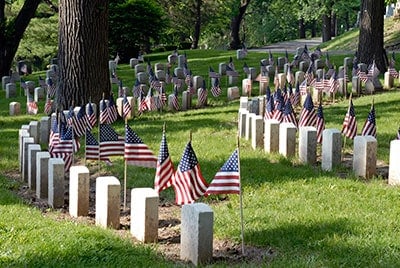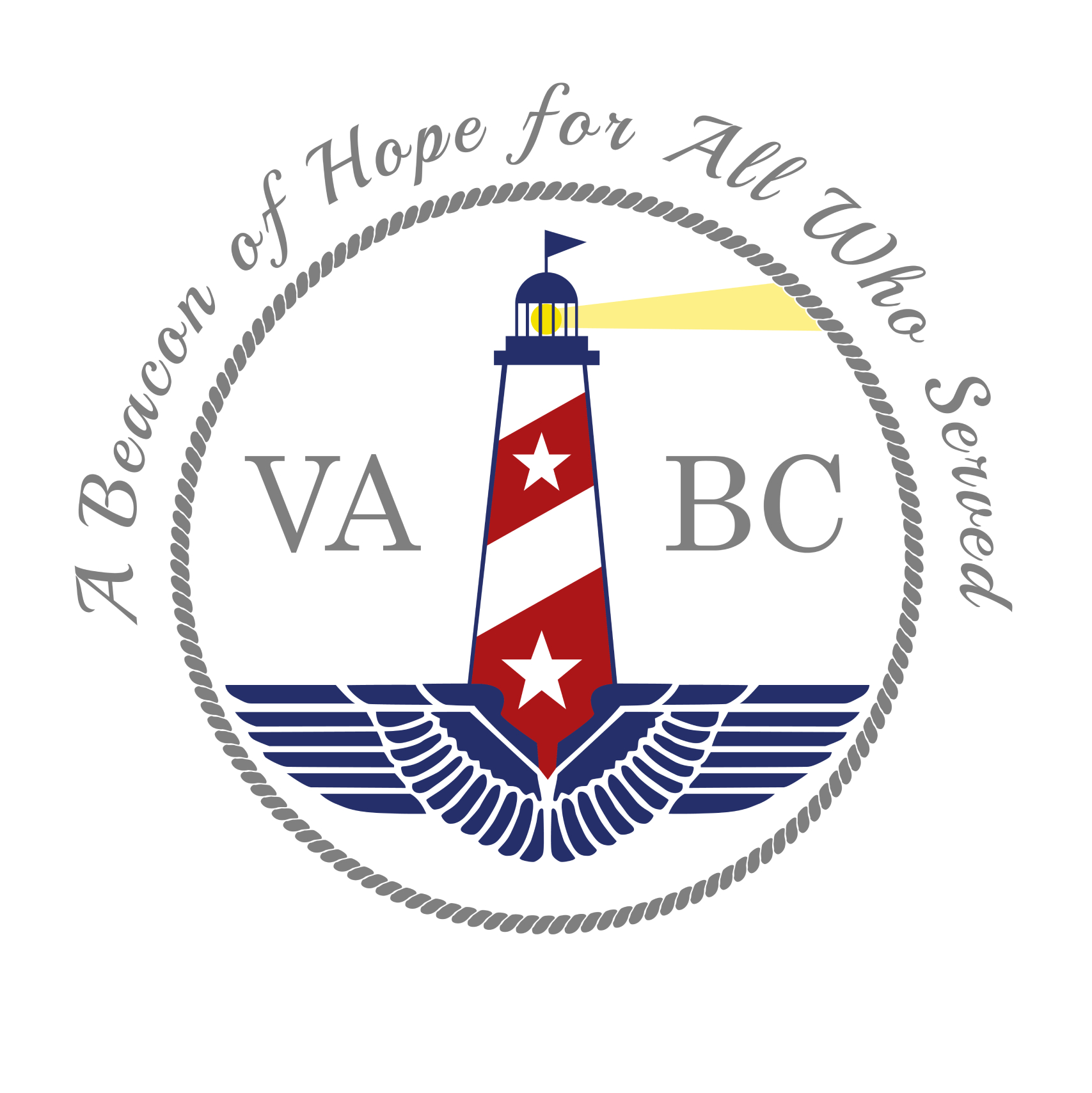VA Burial Benefits
Burial in a National Cemetery
 The Veterans Administration operates over 100 National Cemeteries around the country, and provides no cost burial for eligible persons. Burial benefits available include a grave site in any cemetery with available space, opening and closing of the grave, perpetual care, a Government headstone or marker, a burial flag, and a Presidential Memorial Certificate at no cost to the family. Some veterans may also be eligible for Burial Allowances.
The Veterans Administration operates over 100 National Cemeteries around the country, and provides no cost burial for eligible persons. Burial benefits available include a grave site in any cemetery with available space, opening and closing of the grave, perpetual care, a Government headstone or marker, a burial flag, and a Presidential Memorial Certificate at no cost to the family. Some veterans may also be eligible for Burial Allowances.
Cremated remains are buried or inurned in national cemeteries in the same manner and with the same honors as casketed remains. Burial benefits available for spouses and dependents buried in a national cemetery include burial with the veteran, perpetual care, with the spouse or dependents name and date of birth and death inscribed on the veteran’s headstone. Eligible spouses and dependents may be buried, even if they predecease the veteran.
Grave sites in Department of Veterans Affairs (VA) national cemeteries cannot be reserved in advance; however, reservations made prior to 1962 will be honored. Families are encouraged to prepare in advance by discussing cemetery options, collecting the veteran’s military information including discharge papers, and by contacting the cemetery where burial is desired.
Veteran Burial Benefits for a Private Cemetery
Veteran burial benefits for a private cemetery include a Government headstone or marker, a burial flag, and a Presidential Memorial Certificate, at no cost to the family. Some veterans may also be eligible for Burial Allowances. There are no benefits available to spouses and dependents buried in a private cemetery.
If burial will be in a private cemetery and a Government headstone or marker will be requested for the veteran’s grave, the family should complete VA Form 40-1330 (Application for Standard Government Headstone or Marker for Installation in a Private or State Veterans’ Cemetery) in advance and place it with the veterans military discharge papers.
Eligibility for Veteran Burial Benefits
- Any member of the Armed Forces of the United States who dies on active duty.
- Any veteran who was discharged under conditions other than dishonorable. With certain exceptions, service beginning after September 7, 1980, as an enlisted person, and service after October 16, 1981, as an officer, must be for a minimum of 24 continuous months or the full period for which the person was called to active duty (as in the case of a Reservist called to active duty for a limited duration). Any type of discharge other than honorable may or may not qualify the individual for veterans benefits, and cases of multiple discharges of varying character are also handled case by case.
- Any citizen of the United States who served honorably during wartime with an allied Armed Force, and who was a citizen of the United States at the time of entry into such service and at the time of death.
- Members of Reserve Components and Reserve Officers’ Training Corps
- that are entitled to retired pay under Chapter 1223, title 10, United States Code, or would have been entitled, but for being under the age of 60;
- during a period of active duty for training, were disabled or died from a disease or injury incurred or aggravated in line of duty or, during a period of inactive duty training, were disabled or died from an injury or certain cardiovascular disorders incurred or aggravated in line of duty.
- who die while hospitalized or undergoing treatment at the expense of the United States for injury or disease contracted or incurred under honorable conditions while performing active duty for training or inactive duty training, or undergoing such hospitalization or treatment;
- while attending an authorized training camp or on an authorized cruise, while performing authorized travel to or from that camp or cruise, or while hospitalized or undergoing treatment at the expense of the United States for injury or disease contracted or incurred under honorable conditions while engaged in one of those activities;
- Spouses
- The spouse or surviving spouse of an eligible veteran is eligible for interment in a national cemetery even if that veteran is not buried or memorialized in a national cemetery. In addition, the spouse or surviving spouse of a member of the Armed Forces of the United States whose remains are unavailable for burial is also eligible for burial.
- The surviving spouse of an eligible veteran who had a subsequent remarriage to a non-veteran and whose death occurred on or after January 1, 2000, is eligible for burial in a national cemetery, based on his or her marriage to the eligible veteran.
- The minor children of an eligible veteran. For purpose of burial in a national cemetery, a minor child is a child who is unmarried and:
- Who is under 21 years of age; or,
- Who is under 23 years of age and pursuing a full-time course of instruction at an approved educational institution.
- The unmarried adult child of an eligible veteran. For purpose of burial in a national cemetery, an unmarried adult child is of any age but became permanently physically or mentally disabled and incapable of self-support before reaching 21 years of age, or before reaching 23 years of age if pursuing a full-time course of instruction at an approved educational institution. Proper supporting documentation must be provided.
- World War II Merchant Mariners
- United States Merchant Mariners with oceangoing service during the period of armed conflict, December 7, 1941, to December 31, 1946. Prior to the enactment of Public Law 105-368, United States Merchant Mariners with oceangoing service during the period of armed conflict of December 7, 1941, to August 15, 1945, were eligible. With enactment of Public Law 105-368, the service period is extended to December 31, 1946, for those dying on or after November 11, 1998. A DD-214 documenting this service may be obtained by submitting an application to Commandant (G-MVP-6), United States Coast Guard, 2100 2nd Street, SW, Washington, DC 20593. Notwithstanding, the Mariner’s death must have occurred on or after the enactment of Public Law 105-368.
- United States Merchant Mariners who served on blockships in support of Operation Mulberry during World War II.
- The Philippine Armed Forces. Any Philippine veteran who was a citizen of the United States or an alien lawfully admitted for permanent residence in the United States at the time of their death; and resided in the United States at the time of their death; and,
- Was a person who served before July 1, 1946, in the organized military forces of the Government of the Commonwealth of the Philippines, while such forces were in the service of the Armed Forces of the United States pursuant to the military order of the President dated July 26, 1941, including organized guerilla forces under commanders appointed, designated, or subsequently recognized by the Commander in Chief, Southwest Pacific Area, or other competent authority in the Army of the United States, and who died on or after November 1, 2000; or,
- Was a person who enlisted between October 6, 1945, and June 30, 1947, with the Armed Forces of the United States with the consent of the Philippine government, pursuant to section 14 of the Armed Forces Voluntary Recruitment Act of 1945, and who died on or after December 16, 2003.
- Public Health Service
- A Commissioned Officer of the Regular or Reserve Corps of the Public Health Service who served on full-time duty on or after July 29, 1945. If the service of the particular Public Health Service Officer falls within the meaning of active duty for training, as defined in section 101(22), title 38, United States Code, he or she must have been disabled or died from a disease or injury incurred or aggravated in the line of duty.
- A Commissioned Officer of the Regular or Reserve Corps of the Public Health Service who performed full-time duty prior to July 29, 1945:
- In time of war;
- On detail for duty with the Army, Navy, Air Force, Marine Corps, or Coast Guard; or,
- While the Service was part of the military forces of the United States pursuant to Executive Order of the President.
- A Commissioned Officer serving on inactive duty training as defined in section 101(23), title 38, United States Code, whose death resulted from an injury incurred or aggravated in the line of duty.
Persons not eligible for veteran burial benefits in a national cemetery include service members who die while on inactive training (unless specifically mentioned as eligible above), former spouses (due to divorce or annulment) or family members not mentioned above, and persons with dishonorable discharges, conviction of capital crimes, or conviction of subversive crimes.
Hotlines working to Prevent Veteran Suicides
VA Suicide Hotline – 1-800-273-8255
National Suicide Hotline – 1-800-273-TALK (8255)
Stop Soldier Suicide – 1-800-273-8255 #1

